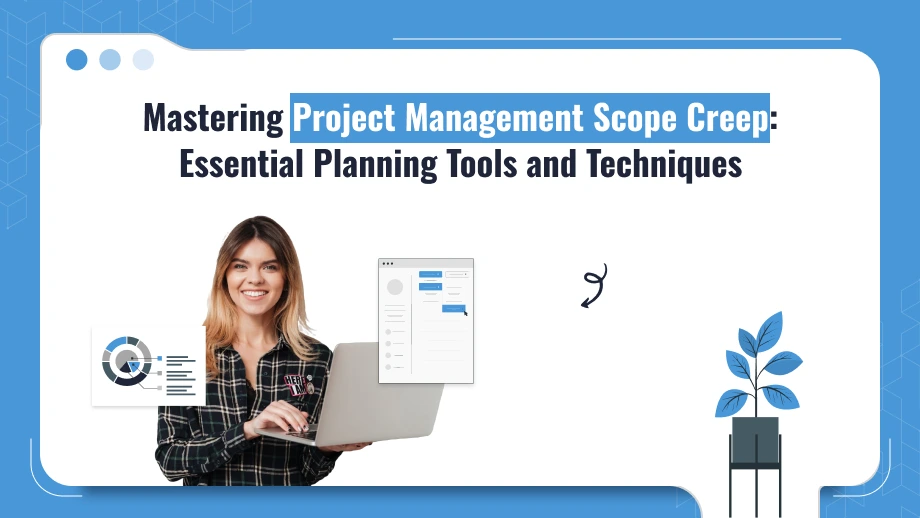
Have you ever spent hours meticulously planning a project, only to have slight changes and additional requests gradually stretch your original goals? This common occurrence in project management scope creep is called scope creep, a silent but significant risk that can derail even the best-laid plans.
Most especially in project management scope creep, managing scope creep is not made of just great leadership but requires the perfect planning tools and techniques. Well-defined project charters, detailed timelines, and comprehensive resource planning will get you to keep your projects on track. In this blog, we shall learn what scope creep is, dig into its causes, and share with you some project management software and consultants who can offer expertise in making sure that scope creep will not lead your projects to derail.
First, let’s take a closer look at the scope creep project management, its common causes, and some best practices to prevent it from happening.
What Is Project Management Scope Creep?
Project management scope creep is an expansion of what was originally intended to be done in a project, without commensurate increases in time, budget, or available resources. This might happen for reasons; it can result from additional features requested by the stakeholder or unclear goals and undefined project boundaries. This often yields increased costs, failure to meet deadlines, and compromised quality.
One of the most effective ways to prevent scope creep is by starting your project with a clear-cut Project Charter Template. A project charter outlines the objectives and key deliverables of a specific project within a defined scope. This means that everyone involved in the project can know all about it, from its boundaries up to its goals and what will finally be delivered, thus cutting down on the danger of management scope creep.
Example of Scope Creep in Action
You are managing a new HR system development effort for a company. The plan includes the base HR features like employee records, attendance, and payroll. Half-way through the project, the client requires you to integrate additional third-party tools, a performance management system, and an automated India payroll software system, without time or cost overrun. This is a project management scope creep.
This is a typical scope creep examples whereby the scope of the project tends to increase without adjustment, hence resulting in delays and creating pressure in the team. It is through the proper use of tools and techniques that one should avoid such challenges where a project management consultant and managers are involved.
Scope Creep Meaning
Scope creep is the uncontrolled expansion or gradual addition of new features, tasks, or requirements to a project beyond the initially agreed-upon scope. This usually happens without corresponding adjustments to the project’s time, budget, or resources. In many ways, project management scope creep happens when changes do not go through a formal change management process and result in delays and financial overruns, and the results are inferior as well.
Common Causes of Project Management Scope Creep
There are many causes of scope creep in project management. Knowing those causes will surely make it easier to work hard in preventing scope creep on your own projects, too. Here are some of the most common causes of scope creep:
1. Undefined Project Scope
It means miscommunication and conflicting expectations may arise if the project scope at the beginning is not clearly defined. This is why a comprehensive Project Charter Template is so significant in defining clear guidelines. The project charter serves as a basic document outlining critical deliverables, budget, and timeline.
2. Inadequate Communication
Poor communications between stakeholders and project teams contribute most to project management scope creep. They are ensured through regular check-ins and updates using project management software that everyone is aligned with the original goals of the project, and changes are tracked and managed properly.
Tame Scope Creep – Master Project Management Now!
Learn to control project management scope creep by defining scope, managing changes, and ensuring project success.
3. Stakeholder Pressure
Another request that stakeholders usually make for change or additional features once the project is in progression. This can result in a quick growth of scope if not dealt with properly. With planning tools and techniques like change control processes, a project manager can have all the new requests that they will be asked to add to a project evaluated well before adding them to that particular project.
4. Lack of Change Control
Without a formal change control process, modifications can begin to occur to the project without proper review of it, and thus scope creep happens. An articulated change control process ensures any changes made to the project are evaluated based on the creation of influences on the schedule, budget, and resources used.
Consequences of Project Management Scope Creep
The effects of scope creep may be adverse to the prospects of the success of a project. Let’s take some of the common effects that take place when scope creep happens to a project, and scope management is not applied during the project management:
1. Missed Deadlines
Normally, an expansion of the scope in any project leads to delayed time schedule and even misses the deadline for the completion of the project. The reasons for the same include more time taken for extra assigned tasks and, hence, renders the availability of resources and time schedule under pressure.
2. Increased Costs
With the scope, therefore, comes an increase in the budget. In most cases, scope creep leads to a budget overrun due to more resources, time, and human power required in sustaining the additional requests. This is likely to be the most challenging for industries that are bound by narrow budget constraints.
3. Reduced Quality
When scope creep is too extensive such that it stretches tasks too thin, the deliverables may then come in compromised terms of quality. As usual, pressure translates to hurry, and poor work below par for what was expected by a client.
4. Team Burnout
Scope creep increases the workload of the project team, hence increasing stress and burnout levels. The pressure to meet the original deadlines may be too much for the team when trying to accommodate new requests.
How to Prevent Project Management Scope Creep
Control of scope creep needs to both proactive and reactive. Some of the best planning tools and techniques that help to keep your project on track include the following:
1. Use a Detailed Project Charter
Start with a well-defined Project Charter Template outlining the scope, objectives, deliverables, and boundaries of your project. A properly designed project charter helps define expectations about what is and isn’t going to be done for all stakeholders, making it easier to deal with requests for new features or work.
2. Implement Change Control Processes
Even with a well-defined project charter, changes cannot be avoided. To manage these changes you would opt for a change control process that is formal enough to give room for reviewing and approving all changes made to the project. You can use project management scope creep software for tracking purpose and keep all team members updated on any changes.
Conclusion
Scope creep is always an issue in project management scope creep, however it is possible to control with the right strategies and tools. With a clear Project Charter Template, implemented change control processes and the use of project management scope creep, a project manager can take his projects back on track as well as be within budget.
Whether you work on a complex IT project, manage an ongoing marketing campaign, or work in the area of India payroll software, maintaining control over scope is invariably something related to the successful completion of any project. A Project Management Scope Creep Consultant can provide much-needed experience in working with planning tools and techniques that can help you retain scope control over your project so that it is delivered on time and within budget.









